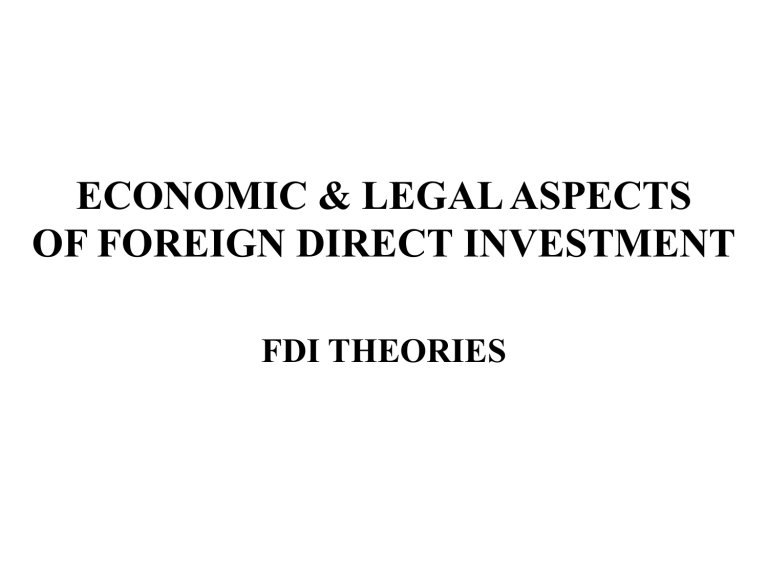Economics & Legal Aspects of Foreign Direct Investment
advertisement

ECONOMIC & LEGAL ASPECTS OF FOREIGN DIRECT INVESTMENT FDI THEORIES 1. Vu Chi Loc, International Investment, 2012, Hanoi National University Publishing house 2. Imad A. Moosa, "Foreign Direct Investment: Theory, Evidence and Practice“, 2002, Palgrave. 3. World Investment Report 1998, Trends and Determinants 4. Charles W.L.Hill, International business: Competing in the Global Marketplace, 2007, McGraw - Hill Irwin THEORIES OF FOREIGN DIRECT INVESTMENT 1. Theories assuming perfect markets 2. Theories assuming imperfect markets 3. Other theories of foreign direct investment Theories assuming perfect markets: The differential rates of return hypothesis (1) The portfolio diversification hypothesis (2) The market size hypothesis (3) Theories assuming imperfect markets: The industrial organization hypothesis The internalization hypothesis The location hypothesis The eclectic theory (Eclectic/OLI paradigm) The product life cycle hypothesis The oligopolistic reactions hypothesis 1. The Product Life Cycle Theory (Raymon Vernon, 1966) * Situation: * Cycle: -> Initiation (Introduction) Exponential growth (Spread) Slowdown (Maturation) Decline (Senescence) The Product Life Cycle Hypothesis 3 stages: (1) Initial production (price) Improvement (defined demand) (2) Maturity and Export FDI (3) Standardization Import • Initial production (price) Improvement Stage 1 (defined demand) Stage 2 Stage 3 • Maturity and Export FDI • Standardization Import 1. The first stage - The initial production takes place at home, close to the customers - The demand for the new product is price inelastic - As time passed, the product is improved, based on feedback from customers 2. The second stage - Maturity & export of the product to countries having the next-highest level of income as demand emerges in these developed countries - As demand continues to grow & competition emerges, the innovation firm resort to FDI in these countries. - The home countries is a net exporter of the product, while foreign countries are net importers 3. The third stage - A complete standardization of the product and its production process - Price competition from other producers forces the innovating firms to invest in developing countries, seeking cost advantages - The home country starts to import the product from both domestic and foreign firms based in foreign countries. 2. The Eclectic theory - J. Dunning (1977, 1978, 1988) * Develop: - Industrial organization hypothesis - Internalization hypothesis - Location hypothesis * Questions: - Demand for a particular commodity in a particular country - export/expanding into a new line of business within the home country/ indulging in portfolio investment/ licensing its technology to foreign firms Three conditions: + Ownership advantages + Internalization advantages + Location advantages Ownership advantages Imad A. Moosa (2002): Ownership of some intangible assets (particular technology, monopoly power and size, access to raw materials, and access to cheap finance) Dunning (2001): Ownership of, or access to a set of income-generating assets, or from their ability to coordinate these assets with other assets across national boundaries in a way that benefits them relative to their competitors, or potential competitors Internalization advantages - It must be more beneficial for the firm to use these advantages rather than to sell or lease them - Expansion within the firm or selling the rights to the means of expansion to other firms Location advantages - It must be more profitable to use these advantage in combination with at least some factor inputs located abroad 3. The Kojima Hypothesis (1973, 1975, 1985) - Complementarity of FDI (capital, technology, managerial skills) and trade - FDI: + trade – orientated (excess demand for import & an excess supply for export) & promote trade & a beneficial industrial restructuring in both countries + anti-trade- orientated : opposite effects to those of the first kind & promotes unfavourable restructuring The effects of FDI on the home countries and the host countries


